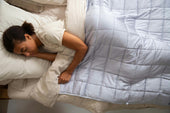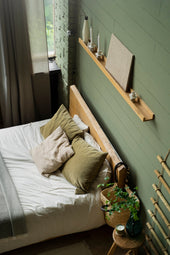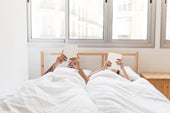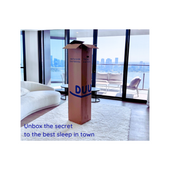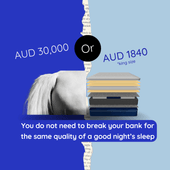We've all been there.
You're lying in bed, scrolling through social media, and before you know it, an hour has passed.
You finally decide to put your phone down, close your eyes, and... nothing. You’re wide awake.
What gives?
It turns out that the blue light emitted by your phone and the habit of late-night social media browsing are major culprits in sabotaging your sleep.
Find out how you can make early bedtimes a regular part of your routine.
The Science of Blue Light and Sleep
Blue light is a type of light that has a short wavelength, which means it produces a high amount of energy.
It's naturally present in sunlight, which is great during the day because it helps keep us alert and awake.
However, the problem arises when we expose ourselves to artificial blue light from screens (phones, tablets, computers) at night.
Blue Light Suppresses Melatonin Production
Melatonin is a hormone that regulates sleep-wake cycles.
It’s often called the "sleep hormone" because its levels increase in the evening to prepare your body for sleep.
However, blue light exposure can suppress melatonin production, tricking your brain into thinking it's still daytime.
Circadian Rhythm Disruption
Our bodies have an internal clock known as the circadian rhythm, which is influenced by light and dark.
Blue light exposure at night can shift this rhythm, making it harder to fall asleep and wake up at the desired times.
Increased Alertness
Blue light increases alertness and cognitive function, which is the opposite of what you want when you’re trying to wind down for the night.
This makes it harder to fall asleep after you've been staring at your screen.
The Impact of Social Media
Scrolling through social media can be a double-edged sword.
While it’s a great way to connect with friends and stay informed, it can also keep you awake for several reasons:
Emotional Stimulation
Social media content can be emotionally engaging.
Whether it's an exciting update, a funny meme, or a controversial post, these emotions can stimulate your brain and make it harder to wind down.
Endless Scrolling
Social media platforms are designed to keep you hooked.
The infinite scroll feature can make it difficult to put your phone down, leading to longer screen time than intended.
FOMO
Fear of Missing Out (FOMO) can keep you glued to your screen, worried you’ll miss something important if you put your phone away.
The Benefits of Going to Bed Early
Now that we know why blue light and late-night social media are bad for sleep, let’s look at the benefits of going to bed early:
Improved Mood and Mental Health
Getting enough sleep is crucial for emotional regulation.
It can reduce stress, anxiety, and improve overall mood.
Better Physical Health
Adequate sleep is essential for physical health.
It can boost your immune system, improve heart health, and help with weight management.
Enhanced Cognitive Function
A good night's sleep can improve memory, creativity, and problem-solving skills.
It also enhances concentration and productivity during the day.
Energy Boost
Waking up after a good night's sleep leaves you feeling refreshed and energized, ready to tackle the day ahead.
Better Skin Health
Sleep is when your body repairs itself, including your skin.
Going to bed early can help reduce the signs of aging and keep your skin looking healthy.
How to Make Going to Bed Early a Habit
Here are some tips to help you establish an early bedtime routine:
Create a Relaxing Bedtime Routine
Develop a routine that helps you wind down.
This could include reading a book, taking a warm bath, or practicing relaxation exercises like deep breathing or meditation.
Set a Consistent Sleep Schedule
Try to go to bed and wake up at the same time every day, even on weekends.
This helps regulate your body's internal clock.
Limit Screen Time Before Bed
Aim to turn off all screens at least an hour before bedtime.
This reduces blue light exposure and helps your brain start to wind down.
Create a Sleep-Friendly Environment
Make your bedroom a sanctuary for sleep.
Keep it cool, dark, and quiet.
Consider using blackout curtains and white noise machines if necessary.
Watch Your Diet
Avoid caffeine and heavy meals close to bedtime.
Instead, opt for a light snack if you’re hungry.
Get Physical Activity During the Day
Regular exercise can help you fall asleep faster and enjoy deeper sleep.
Just make sure to finish your workout a few hours before bedtime.
Manage Stress
Stress and anxiety can keep you awake.
Practice stress-relief techniques like yoga, mindfulness, or journaling to help calm your mind before bed.
Seek Professional Help if Needed
If you have chronic sleep issues, consider talking to a healthcare professional.
There might be underlying issues that need to be addressed.
In a world where our phones are often our constant companions, it's important to recognize the impact of blue light and social media on our sleep.
By understanding the science behind blue light and taking proactive steps to reduce screen time before bed, you can enjoy the many benefits of going to bed early.
Remember, a good night’s sleep is not a luxury; it's a necessity for a healthy, happy life.
So, put down the phone, close your eyes, and let sweet dreams carry you away.










